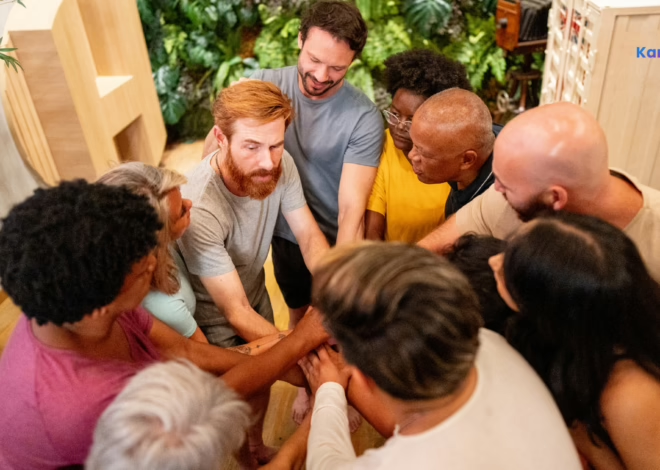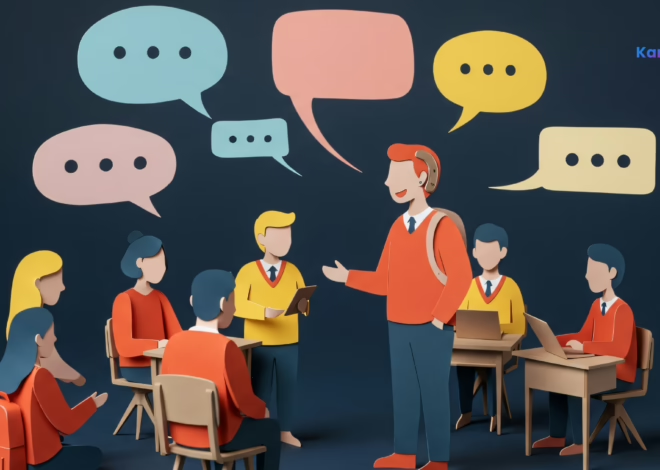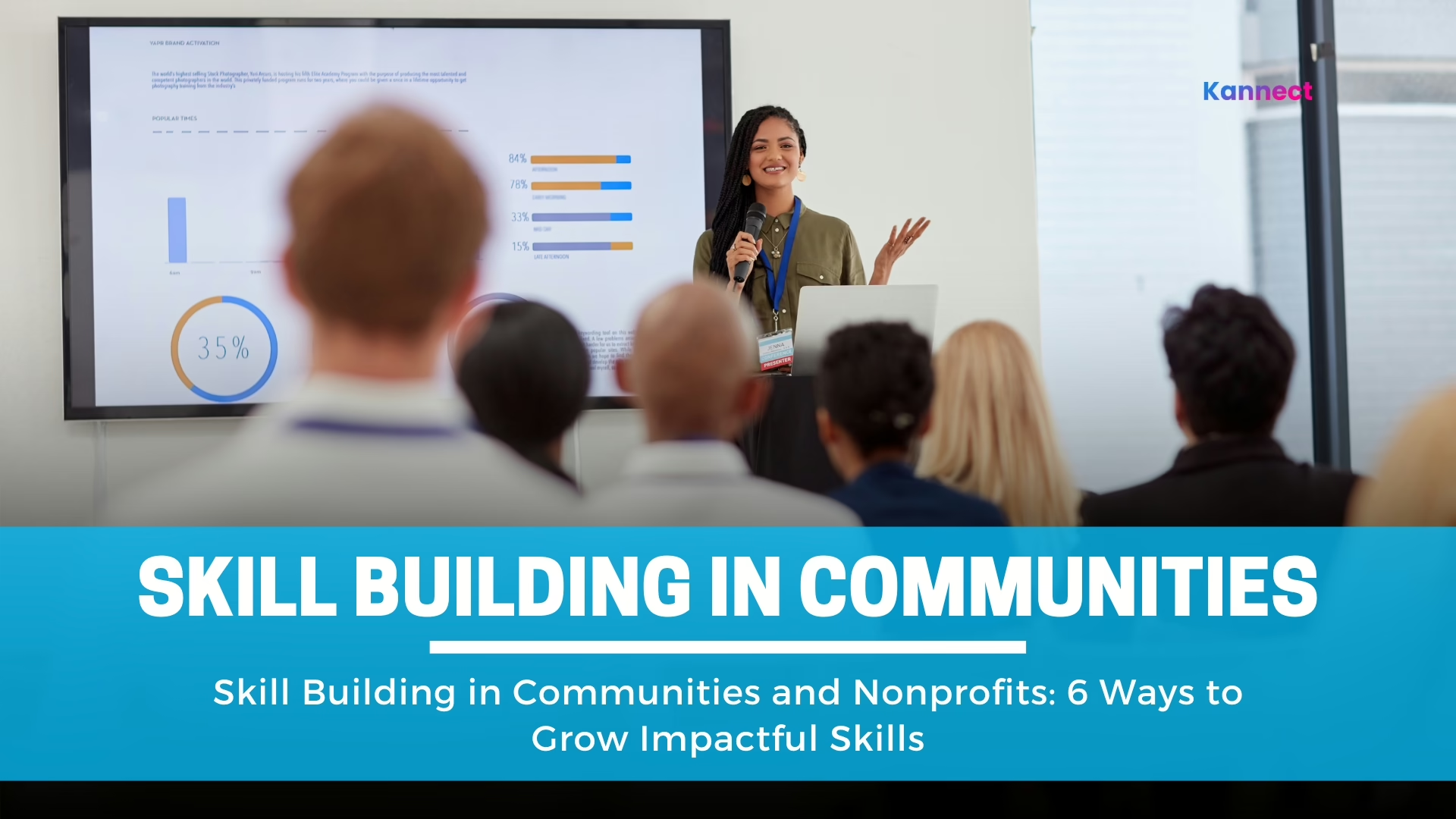
Skill Building in Communities and Nonprofits: 6 Ways to Grow Impactful Skills
Table of Contents
Smart Summary: Here’s what this blog on Skill building will explore
▶ What is Skill Building?
Skill building is the intentional process of developing abilities that empower members and leaders in communities and nonprofits to contribute effectively and grow together.
▶ What are the Four Stages of Skill Development (The Four Levels of Competence)
Skill development progresses through four stages: unconscious incompetence, conscious incompetence, conscious competence, and unconscious competence—guiding effective learning.
▶ What are the Most Essential Skills to Have (Community and Nonprofit Leadership)
Key leadership skills include communication, collaboration, emotional intelligence, digital literacy, problem-solving, and facilitation.
▶ 6 Effective and Trending Skill Building Activities
Popular approaches include workshops, on-the-job training, peer-learning circles, tech bootcamps, leadership retreats, and micro-missions for hands-on practice.
▶ What are Skill Building Activities
Skill-building activities connect learning with real-world tasks like advocacy, event planning, and community projects, often enhanced by gamification and recognition.
▶ What is Skill-Building in Mental Health?
Mental health skill building develops coping, emotional regulation, stress management, and interpersonal skills through evidence-based practices like CBT, DBT, peer groups, and digital tools.
▶ How Kannect Supports Skill Building in Communities and Nonprofits
Kannect’s platform simplifies resource sharing, event management, mentorship, micro-mission assignments, and community engagement analytics to foster impactful skill building.
▶ Ready to Elevate Your Community’s Skills?
Join communities thriving on Kannect. Experience tools that empower members to develop skills and drive impact.
▶ FAQs
Let’s Dive In!
What is Skill Building?
Skill building is a deliberate and ongoing process of developing the abilities, knowledge, and expertise that empower individuals to perform specific tasks confidently and effectively. It goes beyond simply acquiring new talents; skill building fosters meaningful growth that transforms individuals into capable contributors and leaders within their communities and nonprofits. By focusing on both personal and professional development, skill building strengthens members and leaders alike, equipping them with the tools they need to sustain and advance their missions.
In the nonprofit and community context, skill building is essential not only for individual growth but also for organizational resilience and impact. It involves nurturing core competencies such as communication, leadership, emotional intelligence, problem-solving, and digital literacy. Whether through workshops, hands-on learning, mentorship, or technology training, skill building creates capable, adaptable, and empowered individuals ready to address complex social challenges.
Importantly, skill building fosters a culture of continuous learning, where members feel supported through every stage; from initially recognizing what they don’t know, to gaining competence, and ultimately reaching mastery. This process enables communities to flourish as volunteers and leaders develop the confidence to innovate, collaborate, and lead with purpose.
What are the Four Stages of Skill Development (The Four Levels of Competence)
Understanding how people develop new skills is essential for designing effective training and support within communities and nonprofits. The well-known Four Levels of Competence model breaks the learning journey into four distinct psychological stages, helping leaders tailor their teaching and skill-building efforts appropriately.
1. Unconscious Incompetence: Not Knowing What You Don’t Know
At this initial stage, individuals are unaware of their lack of skill or knowledge. They don’t know what they need to learn and often don’t recognize the gaps in their abilities. This can lead to overconfidence or denial about the necessity of learning a new skill.
Example: Imagine a volunteer asked to manage a social media campaign who believes they are capable but is unfamiliar with the platform’s algorithms or best practices. They don’t yet realize the knowledge they lack to effectively drive engagement and outreach. Recognizing this stage is important because individuals need awareness before they can begin learning.
2. Conscious Incompetence: Recognizing Areas for Growth
Here, learners become aware of their deficiencies and understand there is a skill gap. This stage can be uncomfortable because it involves admitting what they don’t know. However, it’s also a powerful motivator to start learning actively.
Example: Our volunteer now realizes that their posts are not reaching the audience as intended. They begin to seek resources, attending workshops or tutorials to bridge their understanding. Acknowledging gaps motivates growth and signals the beginning of intentional learning.
3. Conscious Competence: Acquiring Skills with Intentional Effort
At this stage, learners have acquired the necessary knowledge and can perform the skill but only with conscious focus and effort. They need to think carefully about each step, and tasks may still feel slow or effortful.
Example: The volunteer is now creating and scheduling social media posts successfully but must concentrate fully to follow all best practices thoughtfully. Mistakes may still happen, and performance requires active attention. Support during this phase often involves mentorship, feedback, and practice.
4. Unconscious Competence: Mastery and Automaticity
Finally, individuals master the skill such that execution becomes almost automatic; they perform tasks with ease, without conscious thought, and consistently deliver high-quality results. They can also teach others effectively.
Example: The volunteer now manages multiple social media platforms confidently, optimizing content and analyzing performance intuitively. They mentor peers, offering tips and troubleshooting problems effortlessly. Mastery allows focus to shift to innovation and leadership.
Supporting Skill Building through These Stages
Communities and nonprofits should develop training that recognizes and shepherds members through these stages, combining awareness-building, structured learning, guided practice, and opportunities for mastery. Patience and repetition are key, progression from one level to the next varies by individual but with thoughtful design, skill-building efforts become more effective and rewarding.
What are the Most Essential Skills to Have (Community and Nonprofit Leadership)
Effective leadership and engaged members are the backbone of thriving communities and nonprofits. Developing and nurturing critical skills enhances both individual confidence and collective impact. Here are some essential skills leaders and members should focus on:
▶ Communication:
Clear and empathetic communication is fundamental. Leaders must articulate the mission, goals, and expectations in ways that inspire and connect diverse stakeholders including volunteers, donors, community members, and staff. Active listening enhances trust and strengthens relationships, making everyone feel heard and valued.
For example, a nonprofit leader orchestrating community outreach campaigns must communicate complex information in accessible language while responding empathetically to concerns.
▶ Collaboration:
Working effectively across diverse groups and disciplines is vital. Collaboration involves building consensus, managing conflicts constructively, and fostering teamwork despite differences in background or perspective. A leader coordinating volunteers for disaster relief, for instance, must harmonize efforts among agencies, local residents, and government officials, ensuring everyone shares the same goal.
▶ Emotional Intelligence:
Understanding and managing emotions, both one’s own and others’, determines how leaders respond to challenges and motivate teams. Empathy, patience, and self-awareness create healthier work environments and help navigate sensitive community issues. Leaders with high emotional intelligence can inspire morale, diffuse tension, and encourage resilience, even under pressure.
▶ Problem-Solving:
Creative and adaptive thinking is required to overcome obstacles and innovate within often limited resources. Leaders must analyze complex situations, anticipate risks, and devise actionable solutions. For community leaders tackling homelessness, problem-solving skills enable designing multifaceted programs addressing housing, health, and education simultaneously.
▶ Digital Literacy:
In today’s interconnected world, proficiency with digital tools and platforms amplifies impact. Leaders must master communication channels, data management systems, and social media to engage supporters and disseminate their message effectively. For example, understanding how to leverage virtual meeting software, donor management systems, and online fundraising drives can exponentially increase reach.
▶ Leadership and Facilitation:
Beyond managing tasks, true leadership involves inspiring, guiding, and empowering others to contribute their best. Facilitation skills help run productive meetings, engage participants, and foster inclusive dialogue. Great nonprofit leaders encourage shared leadership, enabling members to develop and exercise their abilities, creating sustainable growth.
How These Skills Enhance Community Resilience and Impact
Building these core competencies strengthens a community’s ability to navigate crises, innovate, and maintain momentum toward its mission. Strong communicators and collaborators build trust that sustains collective action. Emotionally intelligent leaders support mental well-being, crucial for volunteer retention and burnout prevention. Problem-solvers adapt plans as realities shift, and digital-savvy leaders open doors to new supporters. Facilitators ensure that all voices contribute to decision-making, enhancing ownership and commitment.
Together, these skills lay the groundwork for inclusive, agile, and impactful communities and nonprofits that can thrive in today’s complex environments.
6 Effective and Trending Skill Building Activities
1. Organizing Workshops and Webinars
Many nonprofits and communities now blend in-person and virtual learning environments to maximize participation and skill transfer. Workshops and webinars on topics like fundraising strategy, digital marketing, leadership development, or mental health awareness empower volunteers and leaders with actionable knowledge. Platforms offering live, interactive features; Q&A sessions, breakout rooms, polls, foster engagement by enabling real-time skill practice and peer-to-peer learning.
For example, a nonprofit hosting a webinar series on “Grant Writing Essentials” can help emerging leaders secure crucial funding while connecting them with experienced grant writers.
2. On-The-Job Skill Training and Mentorship
Pairing novice members with seasoned mentors accelerates learning through hands-on project involvement coupled with continuous feedback. This mentorship allows trainees to navigate real scenarios, receive encouragement, and improve iteratively.
For example, mentoring a volunteer in leading a community outreach program builds confidence and hones leadership skills while immediately contributing to the organization’s goals. This model also aligns with the Four Levels of Competence, helping beginners advance effectively through each stage.
3. Peer-to-Peer Learning Circles
Small, focused groups dedicated to shared learning promote accountability and deepen social bonds among members. In these circles, participants take turns teaching or presenting skill-related topics, exchanging diverse perspectives, and solving problems collaboratively. Peer learning strengthens retention and fosters a culture of continuous growth.
For instance, a peer circle in a community health nonprofit might cover communication skills, with members role-playing conversations they encounter during outreach.
4. Technology Bootcamps
Bridging digital literacy gaps is crucial as technology becomes integral to nonprofit operations. Bootcamps targeting software like CRM systems, data analytics tools, or emerging tech such as AI-driven platforms equip volunteers and staff with competencies essential for efficient work.
A targeted “Social Media Management Bootcamp” can empower volunteers to create engaging content and track impact metrics, amplifying the nonprofit’s reach and engagement.
5. Leadership Development Programs
Coaching retreats, leadership workshops, and structured development plans nurture emerging community leaders. These programs focus on strategic decision-making, conflict resolution, emotional intelligence, and communication skills, vital for guiding teams and managing complex projects.
For example, a nonprofit might offer a weekend leadership retreat combining experiential learning activities with expert talks on nonprofit governance and community empowerment.
6. Micro-Missions for Skill Application
Micro-missions are short-term, well-defined tasks that make applying new skills manageable and less intimidating. These opportunities allow volunteers to “test drive” roles such as organizing a virtual fundraiser for a day or moderating an online discussion group. This approach encourages experimentation, builds confidence, and helps identify best-fit roles for volunteers without overwhelming them. Organizations find micro-missions especially effective in engaging busy members who prefer flexible commitments.
These trending skill building activities combine experiential learning, peer support, technology proficiency, and leadership coaching. Together, they create a dynamic ecosystem where community members and nonprofit volunteers develop skills that are immediately applicable, fostering growth, retention, and impact.
What are Skill Building Activities: Creating Impact and Engagement
Skill building is most effective when learning activities connect directly with real-world application, turning theory into practice. Communities and nonprofits transform projects like community gardening, advocacy campaigns, or event planning into living learning labs, where volunteers develop impactful skills by doing. These hands-on experiences make skill building tangible, credible, and deeply rewarding.
For instance, organizing a neighborhood clean-up not only teaches logistics and teamwork but fosters pride and ownership among participants. Similarly, leading an advocacy campaign helps volunteers practice persuasive communication and strategic planning, skills transferable far beyond the single initiative.
Adding elements like gamification such as point systems, badges, or friendly competitions, infuses fun and motivation, encouraging continued engagement. Recognition of milestones and storytelling about personal growth or community impact deepen enthusiasm and commitment. Sharing volunteer success stories in newsletters or social media spotlights reinforces the value of their newly built skills while inspiring others.
Incorporating these dynamic methods ensures skill building is not abstract but connected to meaningful contributions, creating a virtuous cycle of learning and impact. Developing impactful skills through active participation empowers community members and strengthens the organization’s ability to fulfill its mission.
What is Skill-Building in Mental Health?
Skill building in mental health involves actively developing practical abilities that help individuals manage their emotions, thoughts, and behaviors to enhance overall psychological well-being. It goes beyond mere awareness; it emphasizes acquiring impactful skills that can be applied in daily life to improve resilience, reduce stress, and foster a greater sense of control.
Practical Examples of Skill Building in Mental Health:
- Coping Mechanisms: Learning specific techniques such as deep breathing, progressive muscle relaxation, or guided imagery helps individuals reduce anxiety and physical tension during stressful situations. For example, a person experiencing panic attacks might use calming breathing exercises to regain control before symptoms escalate.
- Emotional Regulation: Skills like naming and understanding emotions enable better responses to intense feelings. For instance, recognizing that frustration is causing you to snap at coworkers, then choosing to pause and breathe deeply, helps manage reactions more healthily.
- Stress Management: Activities such as mindfulness meditation, journaling, or engaging in physical exercise are popular ways to build resilience. For example, practicing mindfulness daily can improve focus, decrease rumination, and build long-term stress tolerance.
- Interpersonal Skills: Improving communication and assertiveness helps foster healthier relationships. Role-playing conversations or practicing active listening in group sessions can be impactful activities. For instance, a mentorship program might teach volunteers to express empathy and set boundaries effectively.
- Self-care and Self-awareness: Learning to recognize personal needs and implement routines like regular sleep, nutrition, and hobbies build a foundation for mental wellness. An example could be nonprofit staff participating in wellness workshops that teach the importance of boundaries and breaks.
Innovative and Trending Practices:
Educational Campaigns and Games: Interactive activities such as mental health awareness games or stress-relief challenges help normalize mental health skills and encourage participation. In workplaces, well-designed activities like mental health trivia or gratitude journaling sessions foster open dialogue and skill practice.
Therapeutic Techniques: Cognitive Behavioral Therapy (CBT), Dialectical Behavior Therapy (DBT), and Acceptance and Commitment Therapy (ACT) focus heavily on skill building. These approaches teach clients how to challenge negative thoughts, tolerate distress, and accept feelings without judgment. For example, DBT’s distress tolerance skills include activities such as holding ice cubes or engaging in distraction techniques during emotional crises.
Tools and Apps: Digital platforms, apps, and online courses are increasingly used to support mental health skill building. These tools often include modules on breathing exercises, mood tracking, and resilience techniques, accessible anytime to reinforce learning.
Group-Based Skill Building: Peer support groups and workshops serve as impactful environments where members practice skills like active listening, emotional regulation, and assertive communication in a safe, supportive setting. For instance, a community center might run weekly mindfulness sessions or stress management workshops that include skill drills and role plays.
How Kannect Supports Skill Building in Communities and Nonprofits
Kannect offers a powerful platform tailored to enhance skill building efforts within community groups and nonprofit organizations. By simplifying communication, coordination, and engagement, Kannect empowers leaders and members to grow and apply impactful skills more effectively, driving lasting community impact.
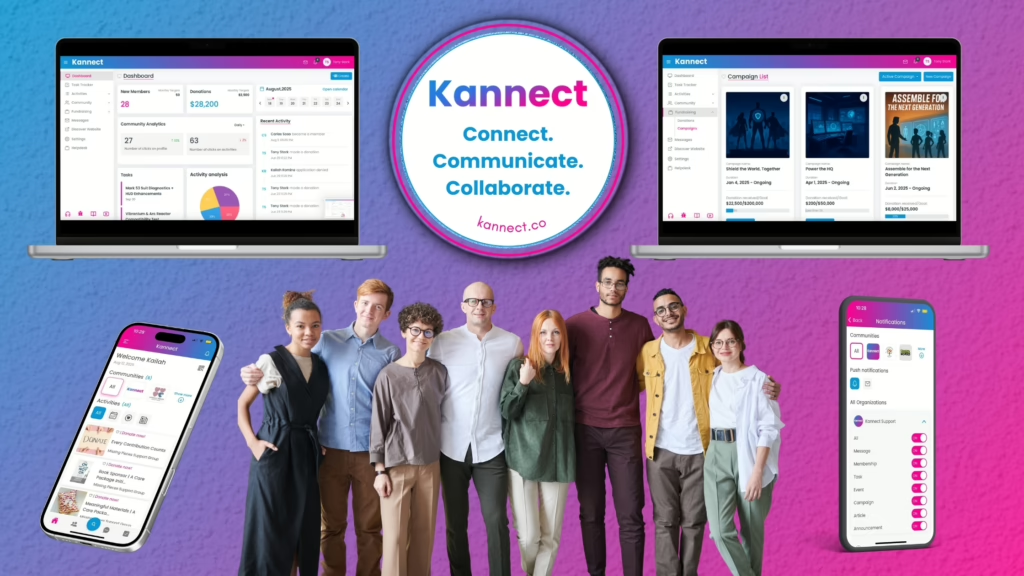
Key Ways Kannect Supports Skill Building:
- Centralized Learning Hub: Kannect enables easy sharing of resources like workshop recordings, webinar links, training materials, and how-to guides, all accessible anytime. This supports continuous learning and allows members to revisit content as needed to deepen their mastery.
- Event and Workshop Management: Organizers can plan, promote, and host both virtual and physical skill-building sessions seamlessly. Automated RSVPs, reminders, and follow-ups help maximize attendance and engagement, ensuring more volunteers benefit from educational opportunities.
- Mentorship and Peer Learning Facilitation: Kannect’s private groups and discussion forums create secure spaces to connect mentees with mentors and encourage peer-to-peer learning circles. Volunteers and leaders can exchange ideas, share feedback, and practice new skills in supportive communities.
- Micro-Mission Tracking: The platform’s task and role management tools support assigning short-term, manageable micro-missions, helping volunteers apply new skills practically without feeling overwhelmed. This structure encourages experimentation and confidence-building.
- Impact Measurement and Feedback: With engagement analytics and feedback, Kannect helps track participation in skill-building activities and collect valuable feedback. Leaders can use this data to refine programming and demonstrate the value of skill development to stakeholders.
- Mobile-First Access: Volunteers and leaders can participate in skill-building opportunities from anywhere using the mobile app, ensuring accessibility and convenience for all members.
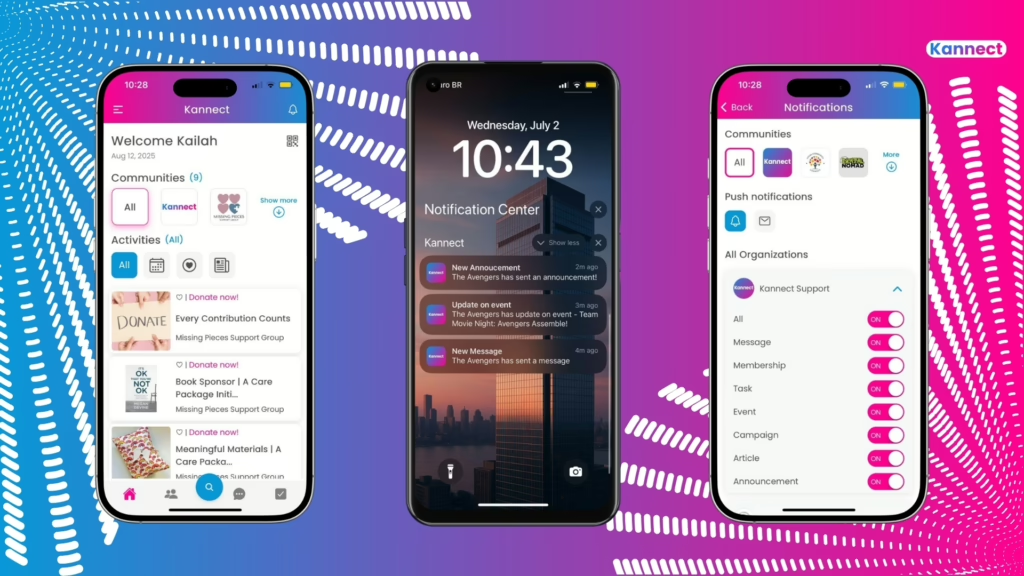
By reducing administrative burdens and fostering meaningful connections, Kannect helps communities and nonprofits focus on what truly matters, the growth and application of impactful skills that strengthen individuals and drive community success.
Ready to Elevate Your Community’s Skills?
Join an expanding network of nonprofit leaders and community builders flourishing on Kannect. Discover how our customizable tools for seamless collaboration, resource sharing, and engagement empower your members to develop and apply impactful skills.
💡 Create your free Kannect account today or schedule a demo and start building your vibrant community focused on skill growth, leadership development, and collective impact.
🔔 Stay connected and inspired by following Kannect on LinkedIn and our social platforms (links below) for expert advice, success stories, and practical resources that strengthen your mission.
✔️ Subscribe to The Community Engagement Playbook for weekly strategies and insights to nurture authentic engagement and sustainable community growth.
Take the leap: empower your members, unlock potential, and amplify the impact of your nonprofit with Kannect. Your journey to stronger skills and stronger communities begins here.
Try Kannect today

FAQ: Quick Answers to All Your Questions
1. What does skill building mean in the nonprofit context?
It means deliberate development of abilities and knowledge enabling members to contribute effectively and grow personally.
2. How can communities support different stages of skill development?
By providing tailored training, mentorship, and practice opportunities that move members from awareness to mastery gradually.
3. What are some innovative ways nonprofits can build skills today?
Virtual workshops, peer learning circles, tech bootcamps, leadership retreats, and micro-missions are gaining traction.
4. Why is on-the-job training effective for volunteers?
It combines experiential learning with immediate feedback, helping volunteers build confidence and competence quickly.
5. How does skill building relate to mental health support?
Building coping, communication, and emotional regulation skills helps individuals maintain mental wellness; nonprofits incorporate this via training and support groups.
6. How can digital literacy improve nonprofit impact?
Enhancing digital skills ensures members can effectively use online tools for outreach, fundraising, and collaboration, broadening community reach.
7. How does mentorship enhance skill building?
Mentorship provides guidance, models best practices, and accelerates skill acquisition with personalized support.

